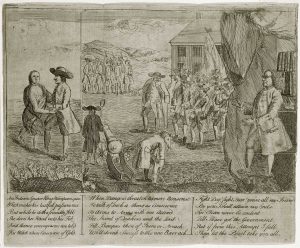By Ashley Katusa

Digital Paxton, an online archive of the Pamphlet War of 1764, catalogs works that are likened to pre-revolutionary Twitter battles according to creator Will Fenton, GSAS.
Fenton’s archive contains 1,700 pages of material from the 1764 Paxton Pamphlet War, some of which had been never before digitized prior to Fenton’s project.
The Pamphlet War arose from opposing views over the actions of the “Paxton Boys” in the time following the French-Indian War, when tension between indigenous people and English settlers was high.
In December of 1763, a mob of settlers from the Paxtang township slaughtered unarmed Susquehannock Indians in Lancaster County, Pennsylvania. These “Paxton Boys,” or “Paxton Men” as they came to be known, managed to continue on to Philadelphia with the intent to intimidate refugee Native Americans. Benjamin Franklin was able to quell the march while it was just outside of Philadelphia.
Opposing views on the actions and sentiments of the Paxton Boys were captured in the material printed in 1764 – over one-fifth of materials printed had reference to the Pamphlet War. The pamphlets often discussed colonization, peace and war, race and ethnicity, masculinity and civility and religious association in pre-Revolutionary Pennsylvania, according to Fenton.
Fenton drew a comparison between the Pamphlet War in 1764 and Twitter wars of today.
“In much the same manner as Twitter bots circulated right-wing conspiracies during the last election, pamphleteers mobilized anonymity, pseudonyms and aliases to amplify talking points, discredit opponents and boost allies in the legislature,” he said.
Fenton said there are similarities among the issues both information battles cover. “Similar to how Donald Trump deployed border security to animate and mobilize various ethnic groups, Paxton allies forged coalitions across unlikely allies by stoking fears of renewed racial violence and promising greater security,” he said.
Fenton believes the Pamphlet War provides historians with a trove of important information, ideas and experimentation from that time period. Fenton said the pamphlets, political cartoons and broadsides deserve the attention of literature and media studies scholars.
“They illuminate a colonial print culture that exemplifies much of the innovation and idiosyncrasy associated with contemporary media culture,” he said.
Fenton began Digital Paxton to support his dissertation, “Unpeaceable Kingdom: Fighting Quakers, Revolutionary Violence, and the Antebellum Novel,” which examines “the discrepancy between fictional representations of fighting Quakers and their historical practices of pacifism and political participation.” It quickly evolved into a large, comprehensive database that is utilized by many.
The project includes print-quality images as well as searchable full-text translations. All of the information is open-source, meaning it is free to view and use by anyone.
Not only does Digital Paxton feature the 28 pamphlets most frequently associated with the pamphlet war, but it also allows public access to rare pamphlets, artworks, political cartoons, broadsides and manuscripts digitalized for the first time. Fenton has spent time in half a dozen different archives, libraries and cultural institutions, notably including the American Philosophical Society, the Historical Society of Pennsylvania and Library Company of Philadelphia.
Fenton say it is a “window into colonization, late-eighteenth century print culture and Pennsylvania on the eve of the American Revolution.”
The task of creating such a large database was challenging, according to Fenton. To transcribe a pamphlet it must be scanned, photoshopped, giiven a digital tracking record that is attached to the file, saved to a server and finally, transcribed. The pamphlets are transcribed letter-by-letter, word-by-word; although perhaps tedious, this ensures accuracy.
Fenton said he understands the sensitive need to give a voice to the indigenous people, as the pamphlets previously studied had colonial bias. By offering more materials than what has been studied in the past, Digital Paxton enables individuals to come to more informed decisions and opinions regarding the incident.
“For too long, scholars have interpreted the Paxton massacre via the Pamphlet War, which reproduces a colonial set of biases. I hope that as we open up the Paxton archive, students and scholars will listen for voices that have previously been drowned out by a singular focus on the print debate,” he said.
Digital Paxton can be utilized as a teaching source, a database for researchers, a tool for students or a resource for anyone who is curious about American history, technology and how it can reflect events happening in current culture.
Fenton hopes his project will enable more people to explore the incident. “I want to see high school and college students engaging these materials and asking questions that wouldn’t even cross my mind,” he said.
Will Fenton is the Elizabeth R. Moran Fellow for the American Philosophical Society, a doctoral candidate at Fordham University and literary scholar. He said he hopes to share his archival experience with as many individuals as possible. Digital Paxton remains an evolving project; Fenton regularly adds new transcriptions.






































































































































































































